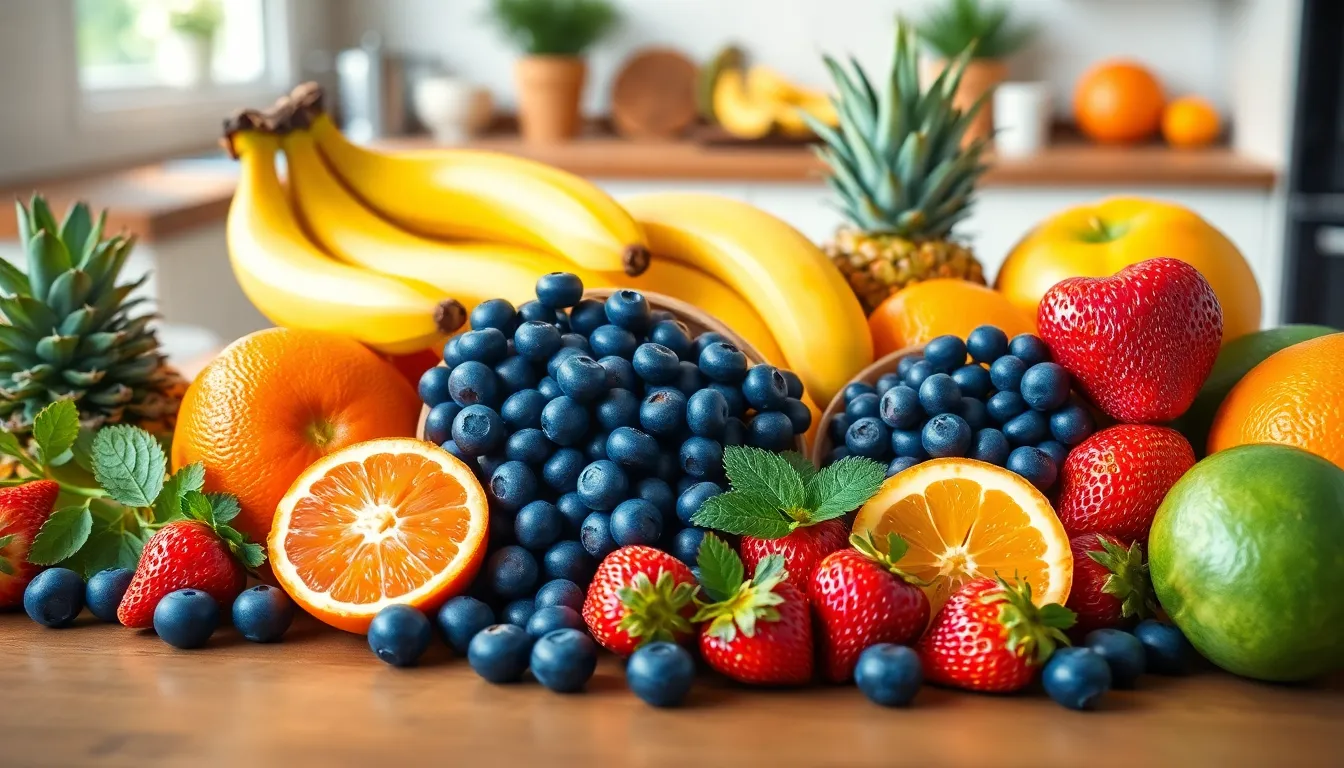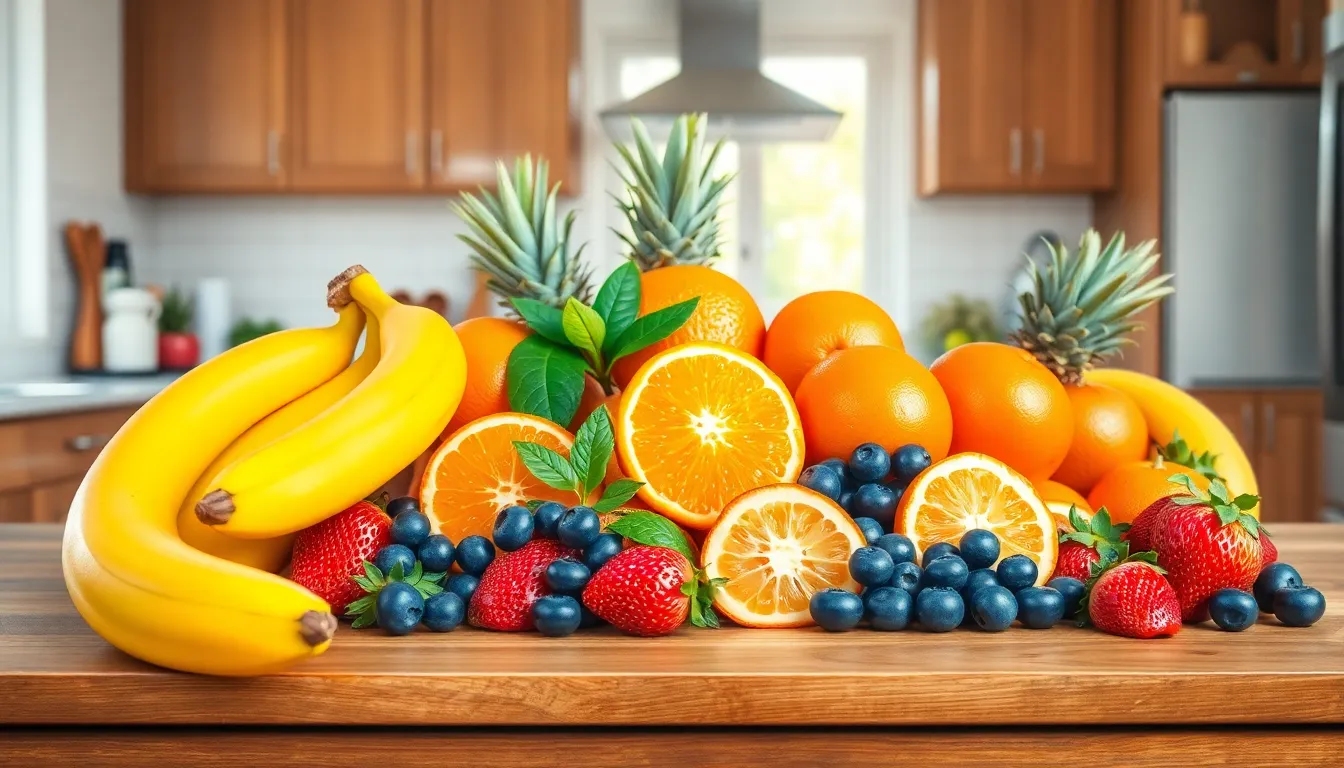Table of Contents
ToggleFeeling a bit like a pressure cooker lately? High blood pressure can sneak up on anyone, but the good news is that nature’s candy can help turn that frown upside down. Fruits aren’t just for snacking; they’re your secret weapon in the battle against hypertension. Packed with vitamins, minerals, and antioxidants, certain fruits can help keep that pesky blood pressure in check while adding a splash of color to your plate.
Overview of Blood Pressure and Its Importance
Blood pressure refers to the force of blood against the walls of arteries. Maintaining healthy levels is crucial for overall cardiovascular health. High blood pressure, or hypertension, affects a significant portion of the population and can lead to serious health issues like heart disease and stroke. Regular monitoring helps detect any abnormal fluctuations early.
Fruits play an important role in managing blood pressure due to their nutrient content. These natural foods contribute essential vitamins and minerals that promote heart health. Specific nutrients, such as potassium and fiber, can help regulate blood pressure effectively. Studies indicate that increased fruit consumption correlates with lower blood pressure levels.
Incremental dietary changes can enhance heart health. Incorporating fruits like bananas, oranges, and berries into meals provides a delicious way to improve blood pressure. The antioxidants found in many fruits also protect against oxidative stress, further supporting arterial health.
Not only do fruits offer health benefits, but they also add visual appeal to dishes. Vivid colors and varying textures make meals more enjoyable. Engaging in a fruit-rich diet can lead to better overall well-being while proactively managing hypertension.
Nutritional Components of Fruits

Fruits contain vital nutritional components that support blood pressure regulation. They provide essential vitamins and minerals critical for overall health.
Vitamins and Minerals
Fruits serve as excellent sources of vitamins and minerals. Vitamin C, commonly found in citrus fruits, supports blood vessel function. Potassium, abundant in bananas and apricots, helps balance sodium levels, promoting lower blood pressure. Magnesium, present in avocados and melons, contributes to vascular relaxation and healthy blood flow. Other minerals, such as calcium in oranges, also play roles in maintaining optimal heart health. Incorporating a variety of fruits in the diet ensures an array of these beneficial nutrients.
Antioxidants
Antioxidants play a significant role in combating oxidative stress, which affects cardiovascular health. Fruits like blueberries and strawberries are rich in flavonoids, providing protective effects against inflammation. These compounds enhance blood circulation and support arterial health. Consuming fruits high in antioxidants may also improve endothelial function, further regulating blood pressure levels. Regular intake of antioxidant-rich fruits contributes to better overall heart health and longevity.
Top Fruits That Lower Blood Pressure
Fruits play a crucial role in managing blood pressure. They provide essential nutrients that support heart health.
Bananas
Bananas are rich in potassium, an essential mineral that helps balance sodium levels. By lowering sodium, potassium contributes to reduced blood pressure. Each medium banana contains approximately 422 mg of potassium. Regular consumption can aid in cardiovascular health and improve overall well-being.
Berries
Berries, particularly blueberries and strawberries, are high in flavonoids. These compounds enhance blood circulation and support arterial health. Studies show that consuming three servings of blueberries weekly can lead to significant reductions in blood pressure. Adding berries to meals not only boosts health but also adds natural sweetness.
Oranges
Oranges are an excellent source of vitamin C, which supports blood vessel function. Each medium orange contains about 70 mg of vitamin C. Their high potassium content further aids in lowering blood pressure. Incorporating oranges into the diet promotes hydration and adds vibrant flavor to dishes.
Apples
Apples, especially with skin, provide fiber and antioxidants. The soluble fiber in apples can help reduce cholesterol levels, promoting heart health. Additionally, they contain quercetin, which has been linked to lower blood pressure levels. Eating an apple daily can contribute positively to cardiovascular wellness.
Kiwis
Kiwis are packed with vitamin C and potassium, making them effective for blood pressure management. One medium kiwi contains around 215 mg of potassium and significant amounts of vitamin C. Studies indicate that consuming three kiwis daily may lower blood pressure more effectively than apples. This makes kiwis a delicious and nutritious choice for heart health.
How to Incorporate These Fruits into Your Diet
Adding fruits that lower blood pressure to daily meals can enhance both flavor and health benefits. Various methods exist to seamlessly integrate these nutritious options into the diet.
Smoothies and Juices
Smoothies provide a delicious way to enjoy multiple fruits at once. Combine bananas, berries, and kiwi for a flavorful blend rich in potassium and antioxidants. Juicing oranges adds hydration while retaining essential vitamins. Pairing spinach with fruits boosts nutrient intake, making the beverage fiber-rich and heart-healthy. Store-bought juices should contain no added sugars to ensure maximum benefits.
Snacking Ideas
Fruits serve as perfect snacks for those looking to reduce blood pressure. Slicing apples creates a crunchy treat that’s high in fiber. Fresh berries tossed in yogurt offer a sweet option packed with vitamins. Bananas can be easily enjoyed on the go, providing quick energy. Dipping orange segments in nut butter creates a satisfying and nutritious snack. Keeping fruits on hand encourages healthier choices throughout the day.
Cooking and Baking
Cooking and baking with fruits infuses dishes with natural sweetness and nutrients. Incorporating sliced bananas into oatmeal adds creaminess and potassium. Using blueberries in muffins enhances flavor while providing antioxidants. Roasting citrus fruits improves their sweetness and can be used in savory dishes. Adding diced apples to salads introduces texture and fiber. Each approach allows for diverse preparation methods that highlight the nutritional benefits of these heart-healthy fruits.
Incorporating a variety of fruits into the diet can be a simple yet effective strategy for managing blood pressure. These nutrient-dense options provide essential vitamins and minerals that support cardiovascular health. By making small changes like adding bananas or berries to meals, individuals can enhance their heart health while enjoying delicious flavors.
Regular consumption of these fruits not only aids in blood pressure regulation but also contributes to overall well-being. Prioritizing these heart-healthy choices can lead to lasting benefits and improved quality of life. Embracing fruits as part of a balanced diet is a proactive step towards better health.




